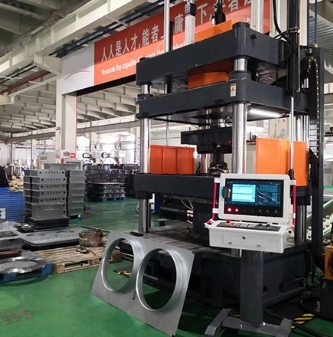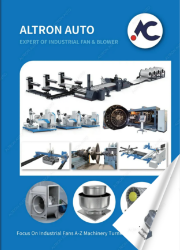Metal Spinning Technology in the 21st Century: Trends and Challenges
Companies that make custom metal components for their industries have seen a significant rise in demand for their products. One technology that has gained popularity in this context is metal spinning. ALTRON, a leading manufacturer, has harnessed the power of metal spinning technology to create bespoke metal components for various applications. This article explores the capabilities and applications of metal spinning technology and its role in meeting 21st century demands.
1. The Art of Metal Spinning Technology
Metal spinning, also known as spin forming or metal turning, is a metalworking process where a flat metal disc or tube is rotated at high speeds while being shaped by a combination of tooling and hand manipulation. This process allows for the creation of highly customizable, precision-crafted metal components with a variety of shapes and sizes. The metal spinning process is not limited to a single type of metal; it can be applied to various materials, including aluminum, stainless steel, copper, and more.
2. Custom Metal Components: Meeting Unique Needs
ALTRON specializes in producing custom metal components through metal spinning technology. This capability is a game-changer for industries with unique requirements. Whether it’s industry fan, automotive, lighting, or architectural design, metal spinning technology allows ALTRON to create components that perfectly match the specific needs of their clients. The ability to craft one-of-a-kind components is a testament to the versatility of metal spinning.
Metal Spinning Technology in the 21st Century: Trends and Challenges
As we step into the 21st century, metal spinning technology faces a range of trends and challenges that shape its development and application. The following are key factors impacting the industry:
- Advanced CNC Technology:The integration of Computer Numerical Control (CNC) technology into metal spinninghas revolutionized the precision and complexity of metal component production. CNC-driven metal spinning machines enable intricate designs with exceptional accuracy and repeatability, expanding the horizons of what can be achieved.
- Sustainability:With the growing focus on sustainability and environmental responsibility, there is an increasing demand for eco-friendly manufacturing processes. Metal spinning is inherently sustainable since it generates minimal waste and uses fewer raw materials compared to other manufacturing techniques. ALTRON and other manufacturers embracing these eco-friendly practices are well-positioned for the future.
- Material Advancements: The development of new materials and alloys has opened up exciting possibilities for metal spinning. High-strength, lightweight materials and alloys are now more accessible, providing a greater range of options for custom components.
- Quality Assurance:In an era where precision and quality are paramount, the implementation of rigorous quality control measures is essential. Manufacturers like ALTRON are investing in advanced inspection technology to ensure that every component meets the highest standards.
- Competition and Innovation: The ever-evolving nature of technology drives constant innovation. As the demand for custom metal components grows, the industry must adapt and innovate to stay competitive.

The Advantages of Metal Spinning Technology in Modern Industry
Metal spinning technology offers a range of advantages that make it a valuable asset in modern industry. Here, we explore the key benefits that have contributed to its enduring relevance and popularity in manufacturing.
1. Versatility in Customization
One of the most significant advantages of metal spinning technology is its ability to create highly customized components. ALTRON leverages this technology to produce unique metal parts tailored to the specific needs of its clients. Whether it’s complex geometries, precise dimensions, or one-of-a-kind designs, metal spinning can deliver components that traditional manufacturing methods struggle to replicate.
2. Cost-Effective Production
Cost-effectiveness is a crucial factor in modern manufacturing. Metal spinning technology minimizes material waste, as it uses a single piece of metal, making it an efficient and sustainable option. Additionally, the process is less labor-intensive than other methods, reducing production costs. ALTRON’s commitment to providing cost-effective solutions through metal spinning technology is a testament to its industry leadership.
3. Precision and Consistency
Accuracy and precision are paramount in many industries, such as aerospace and automotive. Metal spinning technology excels in producing components with tight tolerances, ensuring consistency in every piece. The controlled spinning process delivers high-quality results, making it an ideal choice for applications where precision is non-negotiable.
The Future of Sustainable Design: Metal Spinning Technology’s Role
In the age of sustainability, metal spinning technology has a crucial role to play. ALTRON, a forward-thinking manufacturer, understands the importance of sustainable design and production methods. Here are some key aspects of how metal spinning contributes to a more sustainable future:
- Reduced Material Waste: One of the most significant advantages of metal spinning is its minimal material waste. Unlike traditional manufacturing processes that involve cutting and shaping materials, metal spinning forms the desired shape from a single piece of material. This efficient use of resources reduces waste and minimizes the environmental impact.
- Energy Efficiency: Metal spinning machines are designed to be energy-efficient, with precise control over rotational speeds and tooling movements. This results in lower energy consumption, contributing to a smaller carbon footprint.
- Recyclability:Many of the materials used in metal spinning, such as aluminum and steel, are highly recyclable. This not only conserves natural resources but also reduces the need for primary metal production, which is often energy-intensive.
- Lightweight Design:Metal spinning technology allows for the creation of lightweight components without compromising strength and durability. In industries like aerospace and automotive, this translates to improved fuel efficiency and reduced emissions, further promoting sustainability.
- Custom Solutions for Green Initiatives:Industries and businesses that are committed to environmental sustainability often require custom solutions. Metal spinning’s ability to produce unique, application-specific components is invaluable for companies seeking to meet their sustainability goals.
Conclusion
The power of metal spinning technology, as harnessed by ALTRON and other forward-thinking manufacturers, is evident in its ability to deliver custom metal components that meet the unique needs of diverse industries. With the ongoing trends and challenges facing the industry, metal spinning is set to evolve and play a pivotal role in shaping the future of sustainable design and manufacturing. As the demand for custom, precision-crafted components continues to grow, metal spinning technology stands as a versatile and sustainable solution, poised to meet the challenges of the 21st century.


